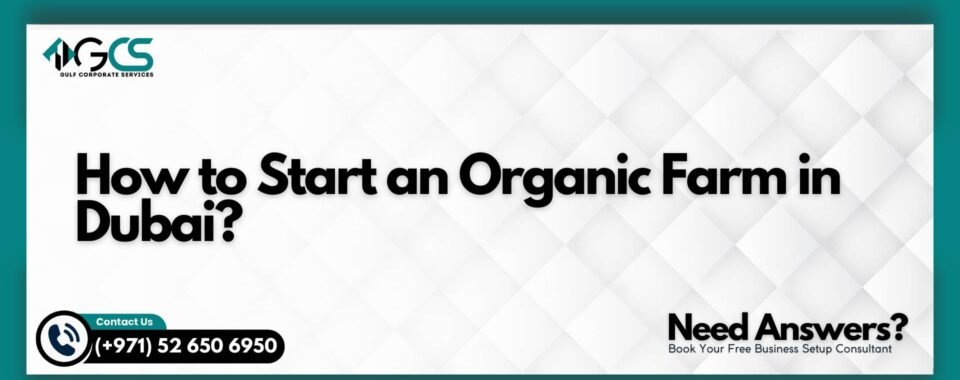
Starting an organic farm in Dubai is more than a business idea—it’s a sustainable investment in health, food security, and environmental well-being. In a city known for innovation and forward-thinking, organic agriculture is gaining serious momentum. Whether you’re a local resident or an international investor, setting up an organic farm here can help you grow fresh produce while tapping into a rapidly expanding market.
This guide covers everything you need to know, from regulations and land to licensing and growth strategies. It’s written for serious entrepreneurs looking to enter Dubai’s agricultural sector with purpose and confidence.
Why Organic Farming in Dubai Makes Sense
Dubai may be known for its skyscrapers and luxury lifestyle, but it’s also becoming a leader in sustainable farming. Here’s why it’s a great place to start an organic farm:
Strong Consumer Demand
People in Dubai are more health-conscious than ever. Organic fruits, vegetables, herbs, and even dairy products are in high demand. Supermarkets, restaurants, and individuals are looking for pesticide-free, chemical-free alternatives. If you can provide that, you’ve already got a potential customer base.
Government Support
Dubai’s government encourages agricultural innovation. There’s active support for sustainable practices, clean energy, and hydroponics. Several licensing programs and funding incentives have been developed to promote controlled farming environments.
Strategic Location
Dubai is a trade hub. That means even if your organic farm grows beyond local demand, you’ll have access to export routes into GCC countries, Asia, and Africa. The logistics infrastructure is world-class, giving your business room to grow.
What Is Considered an Organic Farm?
In simple terms, an organic farm grows crops or raises livestock using natural methods. No synthetic fertilizers, no chemical pesticides, and no genetically modified organisms (GMOs). Soil health, water conservation, and biodiversity are key parts of the farming process.
To qualify as organic, you’ll also need to follow strict guidelines and possibly earn certification to prove your methods meet local and international standards.
Types of Organic Farming Suitable for Dubai
Dubai’s climate is arid and dry, but that doesn’t mean organic farming isn’t possible. It just means you’ll need to be strategic.
Greenhouse Farming
Greenhouses provide a controlled environment. You can grow leafy greens, tomatoes, and cucumbers year-round using efficient irrigation systems.
Hydroponic Farming
Hydroponics doesn’t need soil. Plants are grown in nutrient-rich water. It saves space and water—two things that are limited in Dubai.
Vertical Farming
Perfect for urban spaces. You stack crops in vertical layers using LED lighting and climate control. This method is ideal for herbs and microgreens.
Livestock and Poultry (Small Scale)
Organic eggs and dairy products are gaining popularity. If managed properly, small-scale organic livestock farming can be highly profitable.
Step-by-Step: How to Start Your Organic Farm in Dubai
Let’s break the process down into clear, manageable steps:
Step 1: Define Your Farming Model
Start by answering key questions:
- What crops or livestock will you grow?
- Will you use greenhouses, hydroponics, or open fields?
- Are you targeting consumers, restaurants, or retailers?
This early clarity helps you plan costs, equipment, and licensing.
Step 2: Create a Business Plan
Include the following:
- Mission and objectives
- Investment needs
- Market research
- Operation model
- Revenue projections
- Marketing strategy
A solid business plan is essential if you want to apply for funding or approval.
Step 3: Choose a Suitable Location
Land options in Dubai for farming are limited but not impossible. Focus on areas on the outskirts like Al Khawaneej, Al Awir, or in agricultural zones approved by the municipality.
Things to consider:
- Access to water
- Proximity to city markets
- Electricity availability
- Soil suitability (if not using hydroponics)
You can lease land through government entities or private landlords.
Step 4: Apply for a Dubai Organic Farm License
To operate legally, you’ll need to:
- Register a trade name
- Get initial approval from the Department of Economic Development (DED)
- Apply for your Dubai Organic Farm license under the correct activity code
- Submit land lease, business plan, and ID documents
- Comply with environmental and safety requirements
Once approved, you’ll receive your commercial license to operate.
Step 5: Build Your Farm Infrastructure
Based on your model, invest in:
- Greenhouses or hydroponic systems
- Drip irrigation systems
- Solar energy (optional but recommended)
- Cold storage
- Packing and washing stations
- Water tanks and filtration units
Infrastructure costs depend on your farm’s size and complexity.
Step 6: Hire Skilled Labor
Hire workers who are trained in organic farming. This includes knowledge in natural pest control, composting, crop rotation, and irrigation.
You can also work with agricultural consultants to train your team.
Step 7: Apply for Organic Certification
You can work with UAE-based certification bodies or international organizations to certify your farm. This process usually includes:
- Documenting your methods
- Soil and water testing
- Farm inspections
- Periodic audits
Certification increases your credibility and allows your products to be labeled as “Certified Organic.”
Benefits of Starting an Organic Farm in Dubai
Starting an organic farm in Dubai is more than a business—it’s a smart move for sustainability, community impact, and financial growth. Here are some key benefits that make this venture worth pursuing:
High Market Demand
Consumers in Dubai are increasingly choosing healthier lifestyles. From local families to high-end restaurants, there’s a rising appetite for organic produce. This demand creates a reliable customer base ready to pay a premium for chemical-free, fresh food.
Government Support and Incentives
The UAE supports organic and sustainable agriculture through grants, training, and subsidies. Whether it’s through easier licensing or resources to start hydroponic systems, the government makes it simpler for organic farmers to get started and scale.
Low Import Dependence
Dubai imports a large share of its fruits and vegetables. Local organic farming reduces dependence on imports and positions your farm as a valuable source of fresh, locally-grown produce with shorter delivery times and less environmental impact.
Business Ownership Flexibility
Foreign entrepreneurs can fully own and operate an organic farm business in Dubai. There’s no need for a local partner in many business jurisdictions, giving full control and profit retention.
Technology-Friendly Agriculture
Dubai’s openness to agri-tech and innovation allows organic farmers to adopt efficient tools—like vertical farming, smart irrigation, and AI-based crop monitoring—to boost productivity while preserving resources.
Eco-Friendly Brand Building
Operating an organic farm positions you as an eco-conscious brand. This appeals to both individual consumers and businesses that want to support green initiatives. It adds value to your product and increases trust.
Expansion Opportunities
Once your farm is stable, Dubai’s access to the GCC, African, and Asian markets makes export an easy next step. Certified organic produce from Dubai is seen as high-quality and trusted in international markets.
Cost Breakdown for Starting an Organic Farm in Dubai
Starting an organic farm business in Dubai involves both fixed and variable expenses. Here’s a rough guide:
- Land lease (annual): AED 20,000 – AED 100,000+
- Greenhouse/hydroponic setup: AED 80,000 – AED 300,000
- Licensing and approvals: AED 10,000 – AED 25,000
- Labor costs (monthly): AED 3,000 – AED 10,000 per worker
- Equipment and tools: AED 30,000 – AED 100,000
- Certification: AED 10,000 – AED 30,000
Total startup cost can range from AED 200,000 to AED 500,000+ depending on your farm’s size and scale.
Marketing Your Organic Farm in Dubai
Growing crops is just half the battle—selling them is where your business survives or thrives.
Brand Identity
Create a brand that communicates your values—clean food, sustainable farming, health-focused. Packaging should reflect this.
Online Presence
Build a website with a store or order form. Use Instagram and YouTube to show how your farm works. Transparency builds trust in the organic market.
Retail and Wholesale
Sell directly to:
- Supermarkets and specialty stores
- Health food shops
- Online delivery platforms
- Restaurants, cafes, and hotels
You can also set up a weekend stall at organic markets and community events.
Farm-to-Home Subscriptions
Offer weekly produce boxes delivered to homes. This recurring model gives you consistent revenue and customer loyalty.
Challenges to Expect
Running an organic farm in Dubai isn’t without obstacles. Be prepared for:
- Limited water resources (solution: water recycling and efficient irrigation)
- High initial investment
- Certification delays or renewals
- Extreme summer heat
- Pest control without chemicals
- Educating consumers on the value of organic pricing
Being proactive and working with experts helps you overcome these.
Long-Term Growth Opportunities
Once your farm is stable, consider:
- Adding more crops
- Launching an organic food brand
- Expanding into skincare or wellness products using your herbs
- Supplying school canteens and hospitals
- Opening an agri-tourism experience for visitors
Organic farming isn’t just about planting seeds—it’s about building a brand and a future.
Conclusion
Starting an organic farm in Dubai is an exciting and rewarding venture for those ready to work with nature instead of against it. From controlled-environment farming to direct-to-consumer models, Dubai offers the tools, the market, and the support to help your farm grow.
If you’re passionate about sustainability and want to tap into a booming industry, now is the perfect time to act.
Looking to get started? Let our team guide you through every step of your Business Setup in Dubai.
Frequently Asked Questions (FAQs)
Can foreigners start an organic farm in Dubai?
Yes, foreign investors can fully own and operate farms in Dubai, especially in free zones or approved agricultural areas.
How much land is needed to start an organic farm?
You can start with as little as 1,000 square meters using hydroponic systems or vertical farming models.
Do I need certification to sell produce as organic?
Yes, if you plan to label your products as “organic,” you must be certified by an accredited body. This proves you follow organic farming standards.
Is organic farming profitable in Dubai?
Yes, especially with high demand for clean, healthy food. Profitability improves with direct-to-consumer models and value-added products.
What crops grow best in Dubai for organic farming?
Leafy greens, tomatoes, herbs, peppers, and microgreens are ideal for hydroponics and greenhouse setups.
How long does it take to get certified organic?
It usually takes 12 months or more, depending on your soil condition, farming method, and inspection schedules.
What is the role of technology in organic farming?
Technology like climate control, AI-based irrigation, and hydroponic systems helps improve yields while conserving water and energy.








